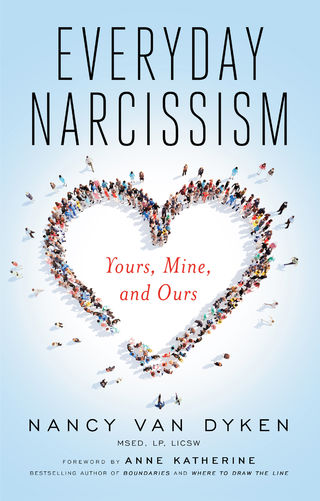Narcissism
Everyday Narcissism
The Book Brigade talks to psychologist Nancy Van Dyken.
Posted August 24, 2017

Narcissism is the psychological disorder of our times. When we think of narcissism, we think of flagrant self-regard that distorts relationships and that, given the grandiose view of oneself and one’s abilities, consumes all the oxygen in a room—any room. But there is a more subtle and insidious version of narcissism that is far more rampant.
What is everyday narcissism?
Everyday narcissism is a low-grade, garden-variety form of narcissism that most of us struggle with, often on a daily basis. This includes you and me and most of the people we know. It also includes many therapists.
How does it operate?
Everyday narcissism is built on a set of harmful myths we are taught as young children. Although they are entirely untrue, they drive our behaviors, emotions, and thoughts. They are regularly reinforced everywhere, and they create a great deal of unnecessary hardship and heartache.
The five myths are:
- We are responsible for—and have the power to control—how other people feel and behave.
- Other people are responsible for—and have the power to control—the way we feel and behave.
- The needs and wants of other people are more important than our own.
- Following the rules is also more important than addressing our needs and feelings.
- We are not lovable as we are; we can only become lovable through what we do and say.
Is everyday narcissism necessary or useful?
No. It is not a harmless habit or neurosis. It makes our lives smaller and less happy.
How do people get everyday narcissism?
Everyday narcissism is taught to us when we are very young by our parents, other family members, teachers, religious leaders, neighbors, and most other adult in our lives. As we get older, we then reinforce the myths of everyday narcissism with our own self-talk. We, and the people we know, also reinforce it in each other.
Most parents don’t realize the harm they are creating by teaching the five myths to their children. The myths were taught to them by their parents, who had been taught them by their parents. As people read my book, they will recognize how they learned the myths as kids—and, perhaps, how they unwittingly passed on these myths to their children. The good news is that as we heal our own everyday, we help heal our children going forward.
How is everyday narcissism different from pathologic narcissism?
My book is not about people with the clinical diagnosis of narcissistic personality disorder. It’s for people like you and me—people who don’t have a major personality issue but whose lives aren’t as fulfilling or as joyful as we want them to be.
It's like the difference between someone in the hospital struggling with clinical depression vs. someone who gets depressed occasionally because they’ve had a hard week or are dealing with a major difficulty in their life. Narcissistic personality disorder is a diagnosis; everyday narcissism is a common way of life.
Why do we need to be concerned about everyday narcissism?
Everyday narcissism wounds people, so most of us walk around wounded. Wounded people tend to wound others, often unintentionally. Everyday narcissism often leads to anger, depression, violence, hopelessness, and a variety of other painful outcomes. These in turn often affect many families, communities, and the culture at large.
In what ways does everyday narcissism manifest in most lives? How does everyday narcissism distort our sense of self and/or behavior in relationships?
When we believe the lies of everyday narcissism we take care of everyone else’s needs but not our own. We believe we can prevent someone from getting angry by saying or doing the right thing. We lie in an attempt to prevent someone else from feeling hurt or angry. This almost never works. In fact, it usually makes matters worse. Many of us become conflict avoidant. We may say yes to some things when we really want to say no. We also expect or demand that everyone else take care of our needs. Then we get disappointed and angry when they don’t.
Basically, because of everyday narcissism, we make ourselves miserable. We may also take out our misery on others.
What are the best ways to overcome everyday narcissism?
The book contains a step-by-step process for healing everyday narcissism.
First we have to learn to recognize everyday narcissism when we see it—in ourselves, in others, and in society at large. Once we name it and can see it, we can begin to change and heal it. My book has lots of specific tools and activities to start that process. For example, learning to say “No, that won’t work for me,” in a kind and gracious manner is really scary for many people. We sense that saying no threatens our need to belong. We fear it may make someone angry and they will go away. And they might. People who want you to take care of them may get upset or angry and go away. However, your real friends will stick around when you are honest with them. My book will help readers say no when they want to say no.
Who would most benefit by reading your book?
Anyone whose life is not as happy or fulfilling as they would like it to be.
If you had one piece of advice, what would it be?
Let me offer three pieces. First, through everyday narcissism, we learned at a young age to not trust ourselves or the messages from our own body or our own innate wisdom. Take the time to pay attention to your own internal wisdom. Take it seriously. As you practice some of the activities in my book, you will learn to trust it and let it guide you.
Second, I want people to understand that they are all valuable, worthwhile, likeable, and lovable just as they are. They don’t need to heed the myths of everyday narcissism in order to be loved or lovable. Third, the wounds created by everyday narcissism can be healed. Life can become peaceful, joyful, and fun. The healing—and the peace, joy, and fun—are what my book is all about.
About THE AUTHOR SPEAKS: Selected authors, in their own words, reveal the story behind the story. Authors are featured thanks to promotional placement by their publishing houses.
To purchase this book, visit:





